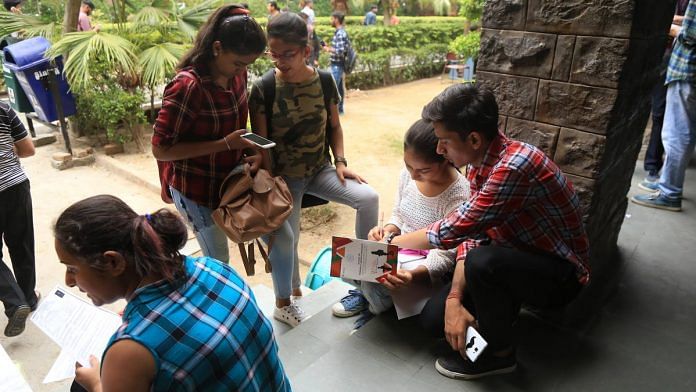New Delhi: Engineering colleges affiliated to the All India Council for Technical Education (AICTE) will be allowed to offer courses in regional languages from the 2021-22 academic session. The council has opened up the provision in its latest approval process, ThePrint has learnt.
The move is part of the Modi government’s push to facilitate education in one’s mother tongue, and is being advocated under the new National Education Policy. In November 2020, the Ministry of Education (MoE) had cleared a proposal, allowing colleges to offer engineering education in mother tongues.
Following this, two committees — one at the MoE level and the other by AICTE — were formed to look at the feasibility of the idea. The AICTE committee has already submitted its report to the ministry and given a green signal to the idea.
AICTE Chairman Anil Sahasrabudhe told ThePrint that colleges that are willing to offer engineering in regional languages can apply with the council and if they meet requirements, they will be granted approval to start the courses.
He added that nothing is being made mandatory and that the choice is with the colleges and the students. The council has for now started work on translating content in eight regional languages including Bengali, Gujarati, Hindi, Kannada, Malayalam, Marathi, Tamil and Telugu.
As reported by ThePrint earlier, the council had conducted a survey on 83,000 students in its affiliated colleges to check their willingness to opt for instruction in one’s mother tongue. Nearly 44 per cent of them had shown interest.
While the AICTE committee has already submitted its report to the ministry, the other panel headed by the secretary (education) is still working on the issue.
On the basis of the MoE committee’s report, a decision will be taken on offering the regional language option in Indian Institutes of Technology (IITs).
According to sources in the committee, nearly 15-20 per cent students in IITs have also shown willingness to pursue engineering in their mother tongue.
Also read: NEET 2021 date out, to be held on 1 August in 11 languages
5 courses to be offered in regional languages
Sahasrabudhe spoke to ThePrint in detail about how engineering education will be offered in regional languages in colleges apart from IITs.
To start with, he said, only departments and courses that are accredited will be allowed to offer the local language option.
“Colleges that have National Bureau of Accreditation (NBA) accredited courses or departments can start offering engineering in regional language in those particular departments or courses,” Sahasrabudhe said. “Suppose a college has NBA accredited civil and mechanical engineering, they can take approval for extra seats from us and offer the course in a regional language such as Tamil, Telugu, Hindi etc.”
He added that the colleges will also need to have trained faculty to teach in that particular language. “The council has already started training of faculty members,” he said.
For now, the council has kept the option open for only traditional engineering disciplines — mechanical, civil, computer science, electrical and electronic. It has also started working on the study material for these disciplines.
According to Sahasrabudhe, over 130 teachers across the country, with expertise in different languages are working on translating the engineering curriculum from English to the eight regional languages — Bengali, Gujarati, Hindi, Kannada, Malayalam, Marathi, Tamil and Telugu.
“We have told the translators to keep the technical words as it is in most cases,” the AICTE chairman said. “Even if they do write a regional language equivalent of a technical word, the English word should also be mentioned in the bracket so that students have a better understanding of the subject.”
According to him, there are technical words — such as capacitor, resistor for example in electrical engineering — that are hard to find a regional language equivalent for and should be kept as is.
“For students who are pursuing engineering in regional languages, the colleges will have to offer compulsory English courses so that once the student is out of college, he or she is job ready,” he added.
On admission for students in regional language courses, the AICTE chairman said it will be on the basis of merit in state and national level engineering entrance exams.
“Regional language courses will not mean we are going to compromise on quality. Only students who qualify on the basis of merit in JEE and other state entrance exams will be granted admission to study in a language of their choosing,” he said.
Other disciplines to also have regional language courses
The MoE, in a written reply in the Lok Sabha Monday to a question regarding availability of content in regional languages, also said that it has started translating content in different regional languages.
“The government is working towards translating reference materials for courses of engineering in major regional languages,” the ministry’s reply, a copy of which is with ThePrint, reads.
It further gave a list of SWAYAM courses (online courses offered by the government) in Science, Engineering & Technology, Humanities & Social Sciences, and Law and Management that have been translated in eight regional languages — Bengali, Gujarati, Hindi, Kannada, Malayalam, Marathi, Tamil and Telugu.
(Edited by Arun Prashanth)
Also read: Common entrance test, entry-exit option in graduation among NEP plans to be launched by May




10% candidates have knowledge?
In Indonesia all medical books are in their own local language, copied ditto from American medical books.